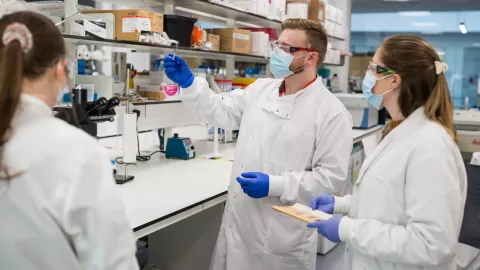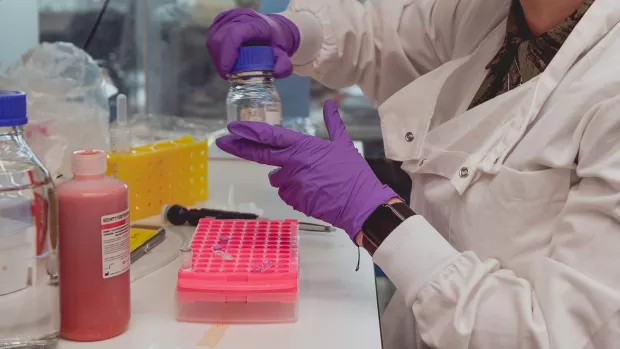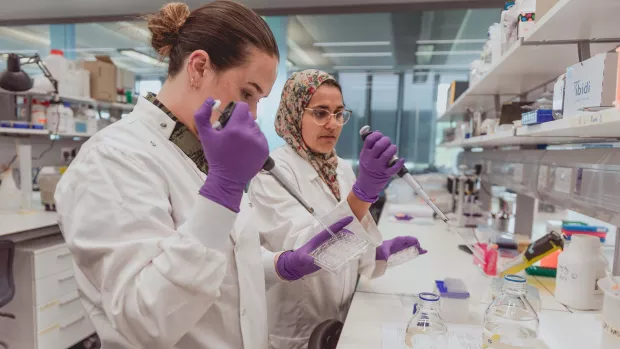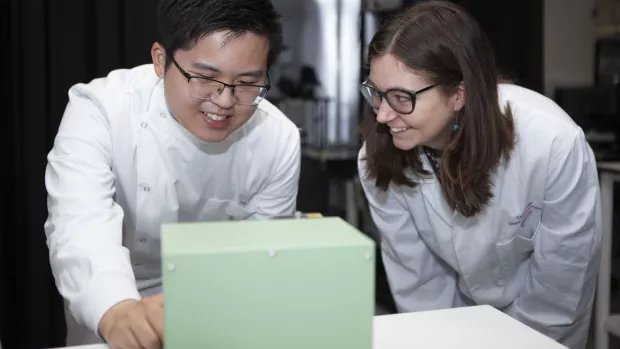
The impact of our research
Since we were founded in 1953, we’ve invested over £227 million into research to understand, diagnose, treat, and prevent MS. Here are just some examples of how your donations have changed the lives of people with MS.
1. Using Botox to manage bladder symptoms
We funded pioneering research in Botox injections for treating bladder incontinence in people with MS. It’s now globally licensed and recommended as one of the most effective bladder symptom management treatments available.
In 2002, we funded researchers at University College London to research the use of Botox injections to treat bladder incontinence in MS. The results of the early study were very promising. And the approach gained interest from a pharmaceutical company, who funded two phase 3 clinical trials.
The trials found Botox injections to be effective at improving quality of life and bladder control.
In 2012, the UK Medicines and Healthcare products Regulatory Agency (MHRA) approved Botox injections for treating urinary incontinence in people with MS. It’s also licensed for use in the US and 13 European countries.
Botox injections remain one of the most effective ways of managing bladder symptoms available for people with MS.
2. New MRI techniques to improve diagnosis
Our funding into MRI research for MS has helped revolutionise MS diagnosis.
In 1976, we funded Professor Ian McDonald to set up a research lab at the University College London Institute of Neurology. Later, in 1984, we also funded the first MRI scanner in the world dedicated solely to MS research, also based in the Institute of Neurology.
We continued to fund and support Professor McDonald and his team to develop new MRI techniques. These techniques have helped to diagnose MS earlier, more accurately, and less invasively.
In 2001, Professor McDonald published the first criteria for diagnosing MS from MRI data. The McDonald MRI criteria are internationally used and recognised, and the ‘gold standard’ of MRI diagnosis in MS.
MRI is a vital tool which allows us to grow our overall understanding of MS, which is why we continue to support MRI research at UCL. Their recent findings include:
- MRI measures taken only one year after diagnosis could predict how MS develops 30 years later
- People with early spinal cord damage seen on MRI scans were more likely to develop secondary progressive MS 15 years later
3. Early research into licensed MS treatment alemtuzumab (Lemtrada)
We funded early research into using alemtuzumab as a treatment for MS. Now, it’s one of the most effective disease modifying therapies for relapsing MS.
In 1991, we funded Professor Alasdair Coles of the University of Cambridge to look at using alemtuzumab as a treatment for secondary progressive MS. Unfortunately, these studies found that alemtuzumab failed to prevent disability progression in people with secondary progressive MS.
But these studies also suggested alemtuzumab could be effective at reducing relapses and new lesions. After this discovery, pharmaceutical companies funded multiple clinical trials of alemtuzumab for relapsing MS.
They showed in comparison to another DMT (interferon beta-1a), alemtuzumab reduced relapse rates and reduced worsening of disability over the short term (2-3 years) in this group. Longer-term studies have shown alemtuzumab maintains low relapse rates over 10 years.
In September 2013, the European Medicines Agency (EMA) approved alemtuzumab for people with highly active relapsing MS.
4. Quitting smoking can slow disability progression
Our world-class research infrastructure has enabled researchers to uncover new links between smoking and MS progression.
Since 2011, we’ve funded the UK MS Register to build up a picture of life with MS in the UK. The data has been used to make vital discoveries about the impact of lifestyle on MS.
In a ground-breaking study, the UK MS Register and collaborators looked at the relationship between stopping smoking and MS disability progression. They discovered:
- quitting smoking can slow the rate of disability progression in MS
- when people with MS quit smoking, the rate at which their disability gets worse slows down. In fact, it slows to a rate that is in line with people who had never smoked.
5. Building a global MS research community
By working together as an international, collective MS research community, we can make life-changing discoveries to help stop MS. We continue to invest in and work with the global MS research community to make these discoveries possible.
Through our continued support, we’ve helped build the MS research community in the UK. By funding PhD studentships and early career fellowships, we’ve helped to kick-start the careers of prominent MS researchers.




